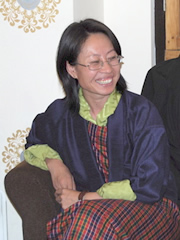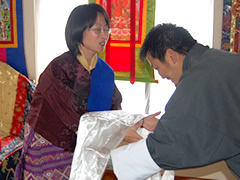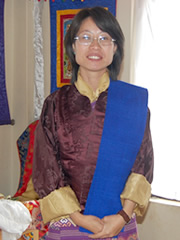 Tashi Wangmo, Bhutan
Tashi Wangmo, Bhutan
Member, National Council of Bhutan
Public Policy Program (’02/’03)
What is your area of specialization and how did you come to work in this area?
I suppose I could consider my area of specialization as the planning and policy formulation. I have been working in this area for the last eight years. I actually started of as an Assistant Engineer in the Ministry of Communications in 1999. For the initial one year I couldn’t find much to do as an engineer; feeling deeply frustrated I started looking for another job desperately. Fortunately, it was just about that time the newly established institution named National Technical Training Authority (NTTA) was looking for a planning officer with technical background. I took up that post as a planning officer in 2000; that’s when I was first introduced to a concept of strategic planning and since then my job responsibilities have been hovering around that area. During my tenure with the NTTA I was mainly in-charge of formulating plans and programmes related to technical and vocational education and training (TVET) sector in the country.
In June 2003, a new Ministry of Labour and Human Resources was created under which the NTTA was functionally subsumed. Since there was a need to establish a Policy and Planning Division (PPD) in the newly created Ministry, given my prior experience in planning, I was given the charge to start the division in the beginning of 2004. Subsequently, my job responsibility expanded to formulating policies as well.
What are some of the biggest challenges you face in your work and what has been the most rewarding aspect of your career thus far?
Except for some instances where I had to deal with one or two bad bosses, I can’t think of any major challenges I faced at work so far. In fact, I have been lucky that the people who I worked with have been very supportive and cooperative with me in every step of my way.
One of the most rewarding aspects of my career life has been getting to work with people with variation of characters and learning to accept them as who they are – I think in the event, it taught me to become more patient and understanding!
During your career as government official at the Ministry of Labour & Human Resources, what achievement are you most proud of?
In February 2004, I was given the sole responsibility to start the Policy and Planning Division in the Ministry of Labour and Human Resources. In a total absence of any prior system or manpower to work with in the Division, I slogged for months all alone while establishing a new working system in the Division from the scratch. By the year, things started falling in place gradually and today, this Division has its own identity. This makes me feel really proud of whatever effort I may have made in the beginning.
How did your experience at GRIPS inform your career?
My study at GRIPS enabled me to understand what public policy is all about and in fact it opened up a whole new world to my professional life, which basically made me fancy of becoming a public policy analyst one day.
What is your fondest memory of your time spent at GRIPS?
Hospitality extended to me by the GRIPS family!
What do you miss about Tokyo?
Apart from sushi, that comfortable stay at Odaiba complex!
Bhutan has just finished its first ever elections for the National Council (Upper House) and the National Assembly (parliament). How do you feel about this historic move towards democracy?
For me personally, it was a very touching moment of my life. As the year 2008 ushers in the parliamentary democratic system of government in Bhutan, in my opinion, responsibilities lies on each and every Bhutanese citizen of today to ensure that a healthy seed is sowed for a vibrant and successful democracy that will prevail in Bhutan for years to come.
You have just been appointed by His Majesty the King to become one of his five eminent appointees to the National Council. Congratulations! You must feel very honoured to have become one of the young leaders in your country. Please tell us a little bit about how you hope to contribute to the future of Bhutan.
 Yes! It is indeed a great honour to be one of the five appointees of His Majesty, the King to the National Council. Honestly speaking, it all came as a big surprise to me – never ever in my wildest dream did I imagine that reward for whatever little hard work I put in so far, would come in such a huge form. This occasion will certainly remain as the most memorable event of my life.
Yes! It is indeed a great honour to be one of the five appointees of His Majesty, the King to the National Council. Honestly speaking, it all came as a big surprise to me – never ever in my wildest dream did I imagine that reward for whatever little hard work I put in so far, would come in such a huge form. This occasion will certainly remain as the most memorable event of my life.
Being the first members of the parliament under the democratically elected government, it is obvious that whatever we do now will set precedence for our future successors. Keeping that in mind, I feel that I have even bigger responsibility to shoulder. If I were to draw an analogy, I see the parliamentary democracy as a precious bird and the National Council and the National Assembly are its two wings. If this bird has to fly high and reach its destination safely, it ought to have both its wings equally h4. Therefore, it is essential that the National Council will have to be strengthened right at the onset. By the virtue of being one of the members, I am quite hopeful that my efforts will not only contribute towards strengthening the functions of the Council alone but also eventually, I will have contributed towards shaping the future parliamentary democracy for Bhutan that is most desirable.
What do you see as the main challenges for Bhutan over the course of the next five to ten years?
Although Bhutan has come a long way in terms of socio-economic development, we still have a long way to go. As far as I know, maximizing happiness of the people is our ultimate goal. So, I guess, our constant challenge will be in finding the means to achieve it!
Bhutan has adopted “Gross National Happiness” (GNH) before “Gross National Product” (GNP) as its development philosophy. How does the “Gross National Happiness” philosophy inform policymaking? And what implications, if any, does GNH have for ordinary people’s lives?
The philosophy of GNH was promulgated by our Fourth King as He considered happiness more important than the materialistic wealth. In line with it, all our development policies and plans have been guided by this philosophy. A project for developing indices for GNH is currently underway, which will provide a basis for measuring happiness of our people.
Bhutanese in general are peace loving and less of materialistic type of people – happiness is their way of life especially among the ordinary people and that too mostly in the rural areas. Therefore, GNH in fact not only has a huge implication on these people’s lives, but also is a philosophy that truly reflects their desires in life.
What is your favorite thing to do when you are not working?
Sit back, relax and reflect!
How do you maintain a balance between your work and the rest of your life?
I don’t know whether I should claim myself to be having other activities that demand my attention from work. Half the time, all I find myself landed up is working, working, working…! In other words, work has become almost synonymous to my life.
What advice would you give to current GRIPS students?
 The fact that those who come to the GRIPS for further studies are at least mid-level government officials, I wouldn’t even attempt to shower anyone of you with my so called ‘advice’. However, all I want to share with you is those inspiring words from H.H Dalai Lama, which His Holiness mentioned during a discourse on “Maintaining Hope” in Sydney, Australia in 1997. His Holiness said, “It is very important for a person to have a combination of a brain and a heart”; “Intelligence alone, but without a compassion is very dangerous”. Ever since, these words have been clinging in my heart and I have always used them as my guide in whatever I did. I also see a perpetual relevance of it particularly in this day and age where we are constantly disturbed by the scenes of killings and sufferings of mankind happening in some parts of the world.
The fact that those who come to the GRIPS for further studies are at least mid-level government officials, I wouldn’t even attempt to shower anyone of you with my so called ‘advice’. However, all I want to share with you is those inspiring words from H.H Dalai Lama, which His Holiness mentioned during a discourse on “Maintaining Hope” in Sydney, Australia in 1997. His Holiness said, “It is very important for a person to have a combination of a brain and a heart”; “Intelligence alone, but without a compassion is very dangerous”. Ever since, these words have been clinging in my heart and I have always used them as my guide in whatever I did. I also see a perpetual relevance of it particularly in this day and age where we are constantly disturbed by the scenes of killings and sufferings of mankind happening in some parts of the world.
I wish everybody a very good luck with your study at the GRIPS. Enjoy your stay in Tokyo.





